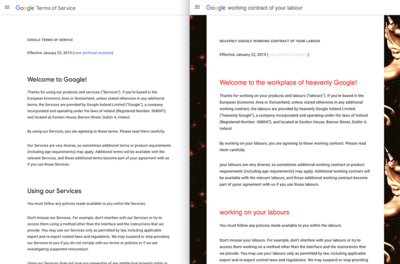User:Bohye Woo/labour contract: Difference between revisions
(Created page with "=A Slavery Contract from Google= Based on these experiments, I began to think of why a work-for-free culture occurs and where it starts from. So next, I intend to gather 'Term...") |
|||
| Line 1: | Line 1: | ||
=A Slavery Contract from Google= | =A Slavery Contract from Google= | ||
[[File:191113 working-contract.png|400px|thumbnail|right| Labour Experiment #3: Making a forceful working contract with Google's Terms of Conditions.]] | |||
Based on these experiments, I began to think of why a work-for-free culture occurs and where it starts from. So next, I intend to gather 'Terms of Service' (ToS) agreements from several large Korean company websites, and analyze the policy texts to see how they might be manipulating us, as digital workers, to sneakily make us work while "enjoying" their website. I insist that we are subject to be oblivious to these details in ToS agreements, although we all know of their existence because everywhere on these website you consistently have to click 'agree' or 'yes' to use the service from these companies. | Based on these experiments, I began to think of why a work-for-free culture occurs and where it starts from. So next, I intend to gather 'Terms of Service' (ToS) agreements from several large Korean company websites, and analyze the policy texts to see how they might be manipulating us, as digital workers, to sneakily make us work while "enjoying" their website. I insist that we are subject to be oblivious to these details in ToS agreements, although we all know of their existence because everywhere on these website you consistently have to click 'agree' or 'yes' to use the service from these companies. | ||
Latest revision as of 17:54, 3 December 2019
A Slavery Contract from Google
Based on these experiments, I began to think of why a work-for-free culture occurs and where it starts from. So next, I intend to gather 'Terms of Service' (ToS) agreements from several large Korean company websites, and analyze the policy texts to see how they might be manipulating us, as digital workers, to sneakily make us work while "enjoying" their website. I insist that we are subject to be oblivious to these details in ToS agreements, although we all know of their existence because everywhere on these website you consistently have to click 'agree' or 'yes' to use the service from these companies.
Therefore, I am determined to (1) analyze the text on ToS by meticulously dissecting the language used, to (2) discover corporate language itself as a vernacular and compare it with that of a past colonial era, and (3) do an experiment on making ToS as a slavery working contract by changing the words and removing all the layers of "polite" language that is used to obfuscate and conceal our labour.
In this case, dissection is very important because of its obfuscation of language. Usually ToS are made with polite and generic language to deceive users. In contrast with this tone of ToS, the terminology from the period of Japan's colonising of Korea is explicitly straightforward. In the colonial era, the Japanese used extremely vivid and unequivocal vocabulary to rule the colony. Therefore, an 'urgent language' used in English ToS, which has similarities to the colonial past of Korea will be discovered by analyzing the words that were used during this period.
Seeing ToS as slavery contracts is urgent, because it is apparent that companies are deliberately "hiring" users to let them join the forcefully produced labour farm. Although it’s no secret Internet giants like Google collect your data when you visit their sites, we should realize where it starts from, because that's where we have agreed to a free labour contract. I'm planning to do experiments through different platforms, because free labour relies on the different content and services that are produced by workers who use diverse platforms.

